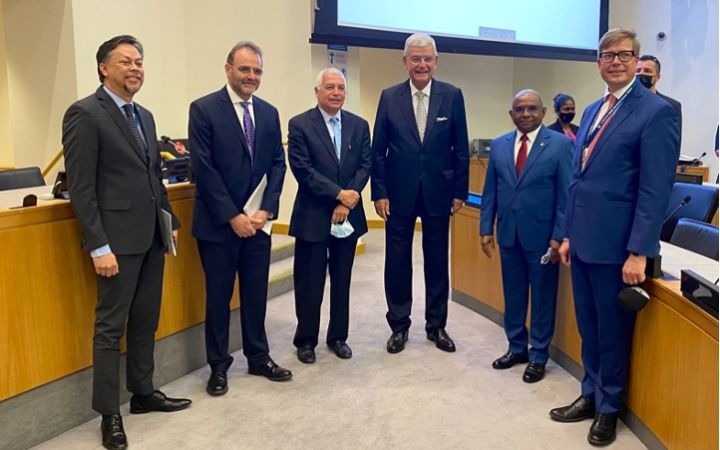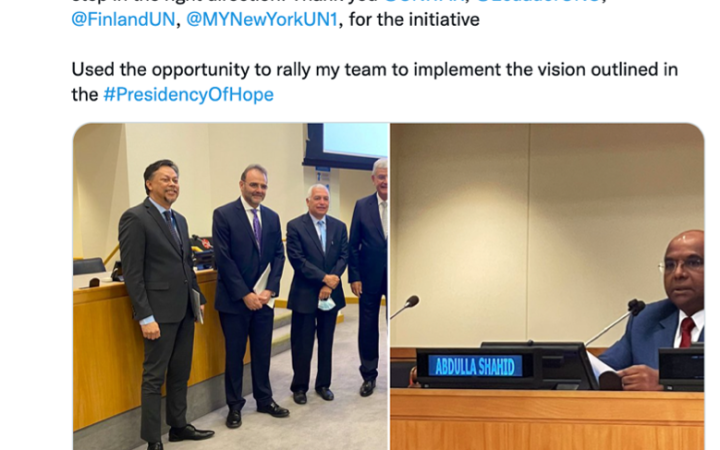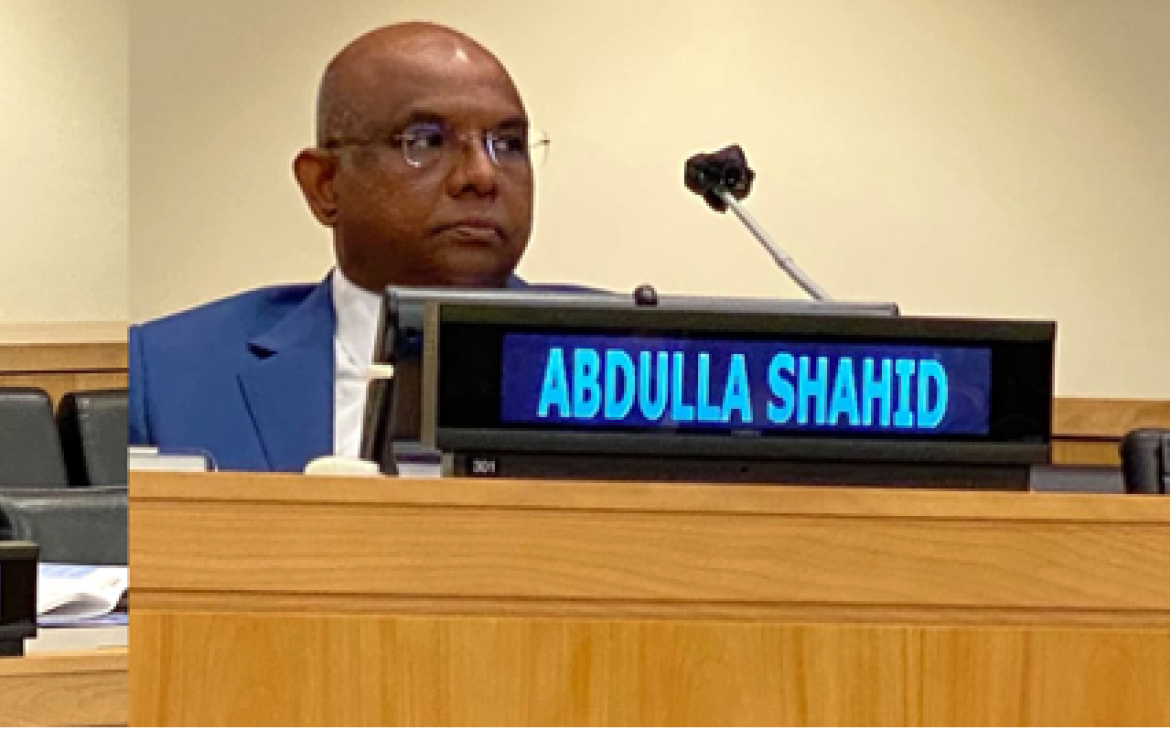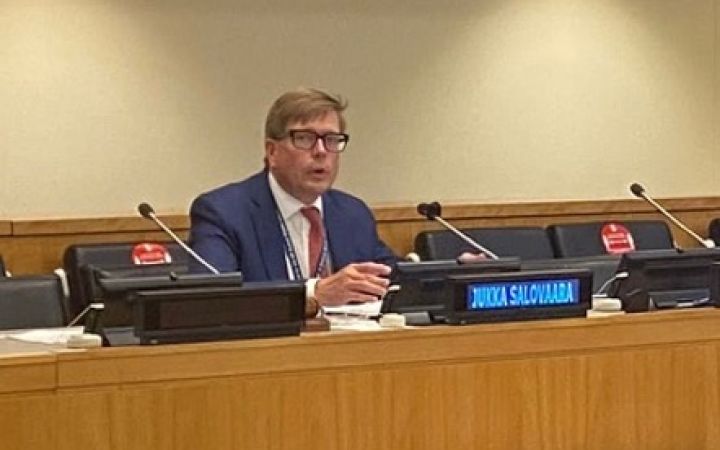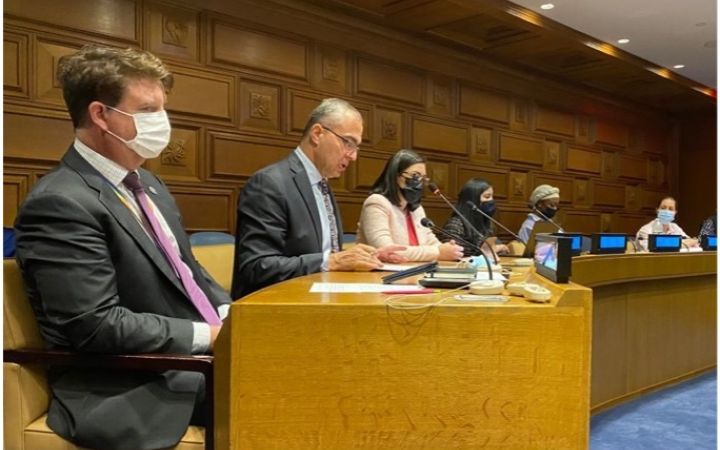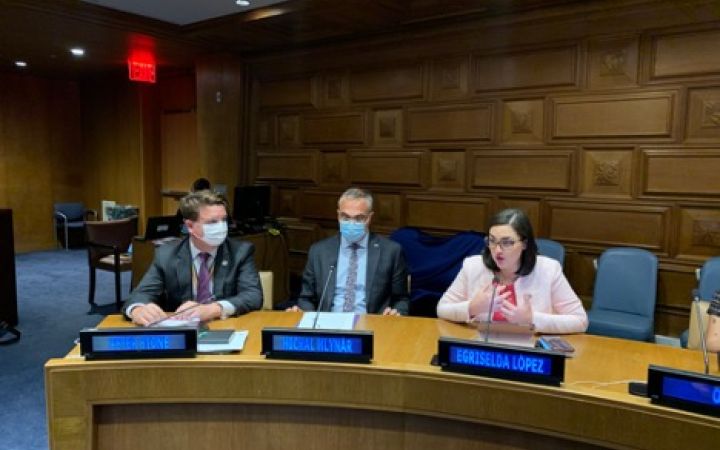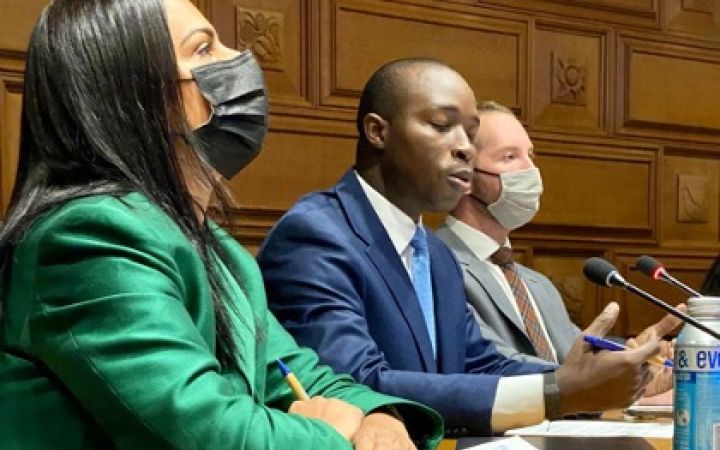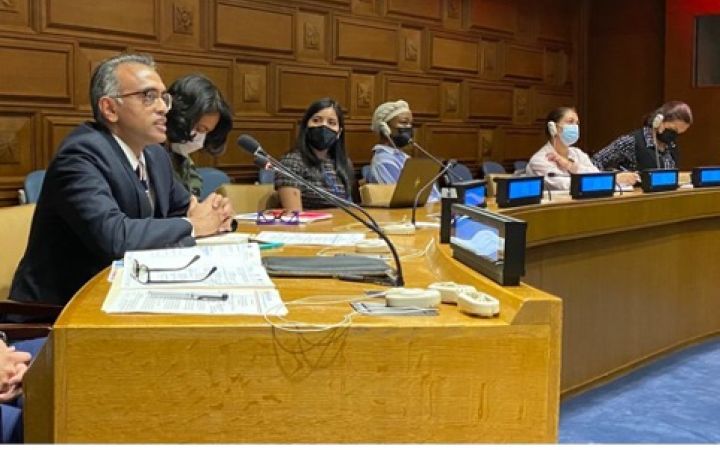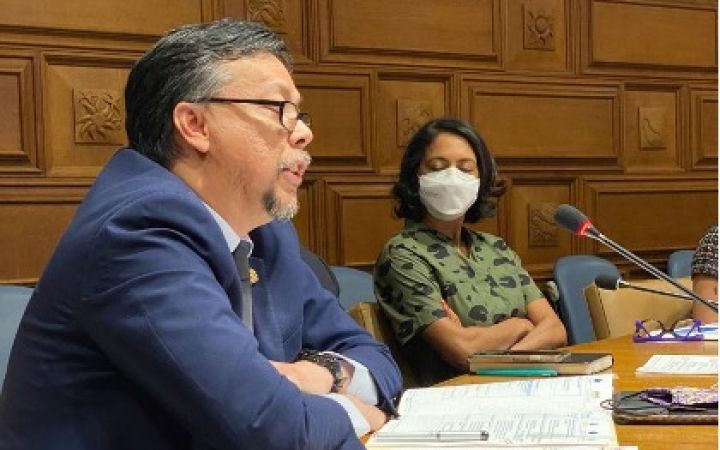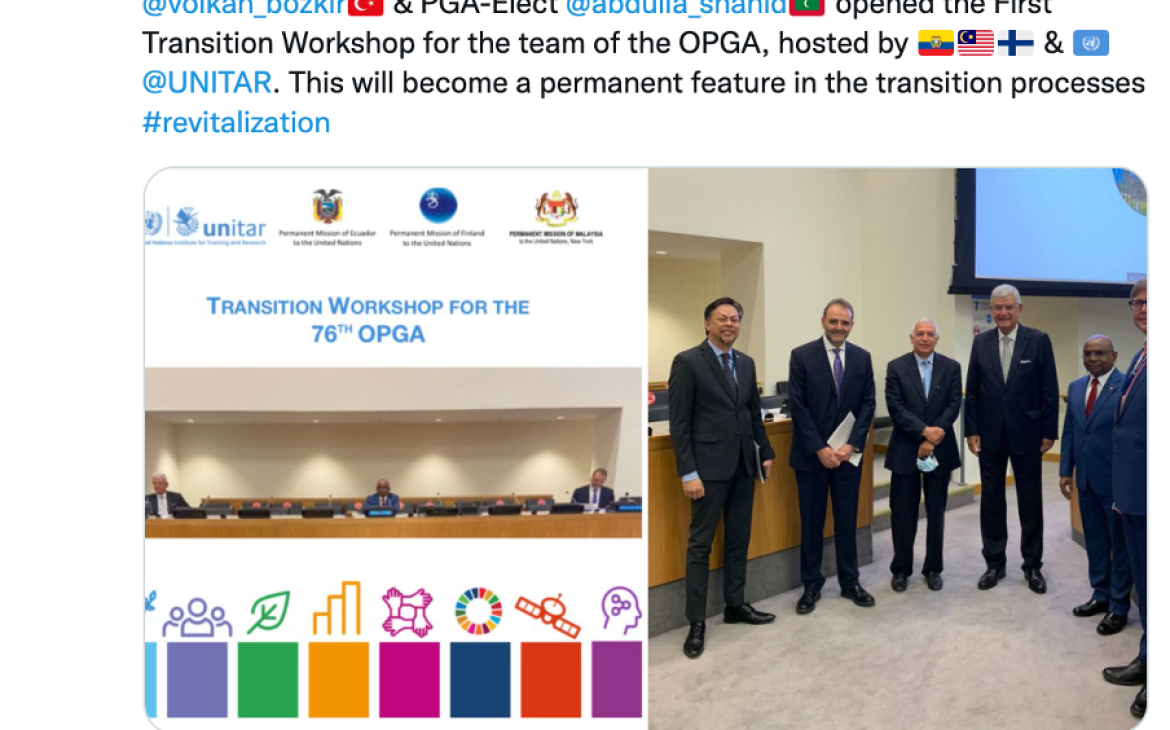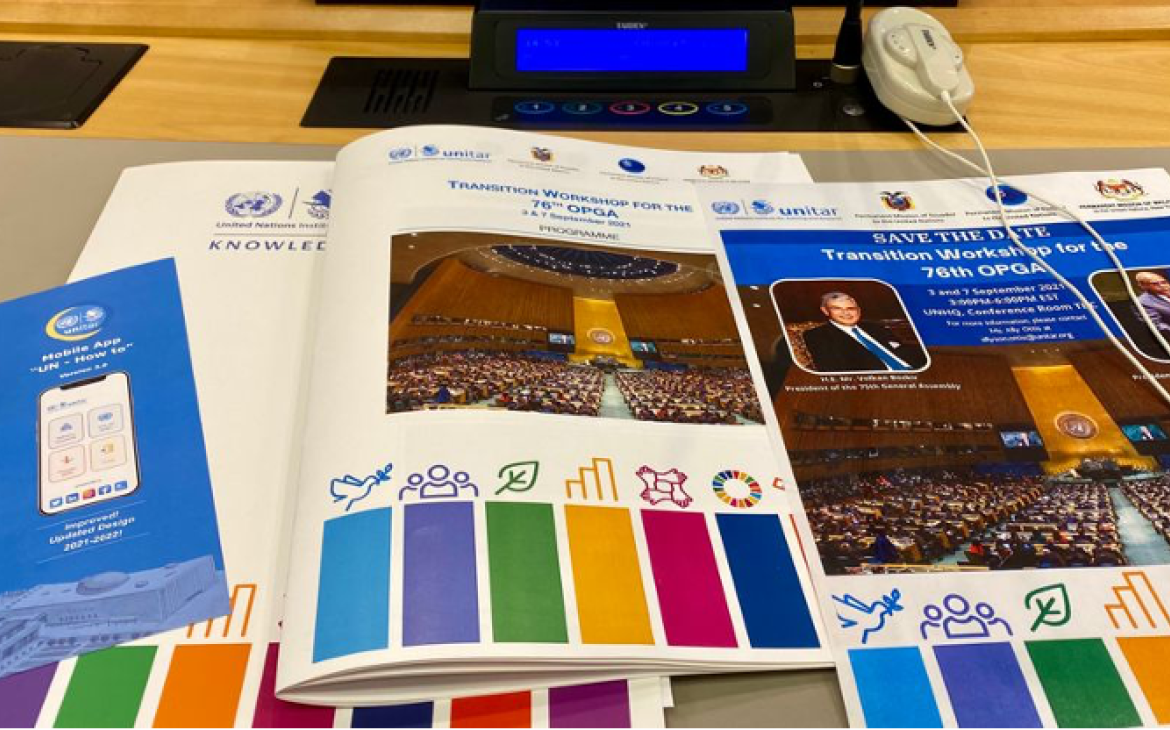7 September 2021, New York, USA – The United Nations Institute for Training and Research (UNITAR) New York Office successfully implemented its two-day training, the “Transition Workshop for the 76th Office of the President of the General Assembly (OPGA),” in partnership with the Permanent Missions of Ecuador, Finland, and Malaysia. This workshop was organized to support the Office of the President of the General Assembly in its transition between the 75th and 76th OPGA, and to specifically facilitate opportunities for existing, former, and incoming OPGA staff to share experiences and best practices for a successful transition. This workshop marked UNITAR New York Office’s first in-person training workshop since the beginning of the COVID-19 pandemic and was attended by more than 30 delegates, following social distancing measures.
On the first day of the transition workshop, Mr. Marco A. Suazo, Head of UNITAR New York Office, opened the session by welcoming the participants. He thanked both PGA H.E. Mr. Volkan Bozkir and PGA-elect H.E. Mr. Abdulla Shahid for their commitment to a successful transition between their offices. Mr. Suazo also acknowledged the presence of multiple Ambassadors, including the Permanent Representative of Ecuador, H.E. Ambassador Cristian Espinosa Cañizares, and the Permanent Representative of Finland, H.E. Ambassador Jukka Salovaara. He briefed participants on the agenda of the two-day workshop and proceeded to yield the floor to PGA Bozkir of the 75th General Assembly.
Mr. Bozkir welcomed the participants and discussed how the United Nations General Assembly (UNGA) commonly has insufficient resources and is not structured to address the systematic challenges faced by UNGA. He spoke about efficiency and professionalism regarding changing these power structures. Mr. Bozkir acknowledged UNGA’s relationship with the Security Council, specifically how the two bodies should work together to accomplish their goals, utilizing the examples of Palestine, Syria and Myanmar in this regard. Mr. Bozkir stressed the importance of a General Assembly that focuses on addressing the challenges of the world and cuts through the challenges that hold the UN back from enhancing its credibility and efficiency.
Mr. Suazo then gave the floor to the President-elect of 76th General Assembly, H.E. Mr. Abdulla Shahid. Mr. Shahid spoke that he believes in a stronger, empowered UNGA that is well-resourced and professionally staffed. He showed appreciation for PGA Bozkir and his team for achieving remarkable results during the pandemic, as well as for reopening the General Assembly. Mr. Shahid emphasized the need to raise the standard of the General Assembly and to continue strengthening OPGA. He acknowledged that the UN does not just want to receive reports detailing impacts, but also must hear about the ways in which the UN is bolstering ambition to support the many important causes it aids.
Mr. Suazo thanked both PGAs for attending and then yielded the floor to H.E. Ambassador Cristian Espinosa Cañizares, Permanent Representative of Ecuador. Ambassador Cañizares stressed the importance of this workshop and the value of sharing experiences and practical recommendations, as well as the opportunity to network and team-build. Ambassador Cañizares acknowledged that the 73rd PGA was H.E. Ms. María Fernanda Espinosa Garcés of Ecuador, highlighting that many lessons were learned through this experience. He additionally emphasized the need for a workshop like this to share vital words of advice for such an office. Ambassador Cañizares then thanked PGA Bozkir for his extraordinary service.
Next to speak was H.E. Ambassador Jukka Salovaara, Permanent Representative of Finland. Ambassador Salovaara spoke on the key issues that were discussed at the Retreat between PGAs. He opined that effective negotiation most often occurs in-person, which facilitated a few challenges considering the COVID-19 pandemic. Ambassador Salovaara praised PGA Bozkir and highlighted the achievements and efficient leadership of his office. He then acknowledged that while the UN has kept all its intergovernmental processes functioning during COVID-19, interactions with stakeholders and civil society have weakened. Ambassador Salovaara stressed the need to encourage increased engagement from the member states and concluded by highlighting the importance of maintaining institutional memory to ensure a stable institution.
Following this, Mr. Mohd Hafiz Othman, Political Coordinator of the 73rd OPGA, and Ms. Saada Hassan, Team Lead of Peace and Security of the 75th OPGA, spoke together to share their experiences and knowledge. Mr. Othman focused on his experiences with high-level week prior to the COVID-19 pandemic. He provided examples of summaries, talking points and weekly updates and highlighted the importance of such items. Mr. Othman also emphasized team efforts and communication with colleagues inside and outside of specific clusters. Ms. Saada Hassan shared her experiences during the COVID-19 pandemic, specifically how the OPGA maintained outreach and collaboration with member states, UN entities, civil society, and the private sector. She spoke on collaborating with the Secretariat in organizing high-level sessions, as well as mentioning sessions that were postponed due to the pandemic, such as the Peacebuilding Architecture Review. Ms. Hassan provided the example of the issue of violence in Gaza during the 75th GA and highlighted the high-level meeting that took place, further emphasizing how UNGA and the Security Council must work together to address key issues.
Ms. Toni-Shae Freckleton, Team Lead of Sustainable Development of the 75th OPGA, was next to speak to the incoming OPGA. She focused on four main points during her session: lessons learned, priority issues of sustainable development, key relationships, and the skills and qualities needed to function within the office. She spoke on collaborating on a strategic work plan with her colleagues during the 75th GA that outlined the priorities of the session. Ms. Freckleton highlighted the importance of communication and having good relationships with member states. She overviewed the key relationships of the Sustainable Development team and encouraged the incoming team to maintain strong relationships with the PGA, the President of ECOSOC, the Secretariat and other UN agents that fund various programmes. Ms. Freckleton concluded her presentation by stressing that stress-management, communication, decision-making, and problem-solving skills will serve the incoming OPGA well.
Mr. Andrea Pontiroli, Senior Adviser on Migration, Refugees and Humanitarian Issues of the 73rd OPGA, spoke last during the Friday workshop. Mr. Pontiroli provided remarks on his experience with the Global Compact for Migration agreement and described the actions taken, noting the negotiation skills necessary for successful outcomes. He also spoke on new procedures, which will enable flexibility to ensure work can be done in a practical manner. Mr. Pontiroli stressed that the incoming OPGA must remember they have been selected to advise the PGA because of their expertise and political knowledge, which will serve them well during the 76th General Assembly. Mr. Suazo provided closing remarks at the conclusion of the first day of the transition workshop. He showed his appreciation for Ecuador, Finland, and Malaysia for supporting this inaugural workshop and reminded participants of the second session occurring 7 September.
On day two of the workshop, Mr. Suazo opened the session by thanking participants and summarizing the last session. He then introduced H.E. Ambassador Michal Mlynár, Permanent Representative of Slovakia, H.E. Ambassador Egriselda López, Permanent Representative of El Salvador, and Mr. Peter Stone, Senior Adviser and Deputy Team Leader of the Reform, Legal and Budget Team, to deliver a presentation on the Revitalization of the General Assembly.
Ambassador Michal Mlynár began by highlighting the Ad Hoc Working Group on the Revitalization of the Work of the General Assembly (AHWG), which he co-chairs along with Ambassador Egriselda López. He addressed the importance of the revitalization process and stressed that UNGA must change in order to deliver on its mandates and ensure adaptability to evolving circumstances. Ambassador Mlynár described balancing the relationship between UNGA and the Security Council, improving working methods, and strengthening accountability and transparency as imperative in the revitalization process. Ambassador Mlynár concluded his remarks by addressing the AHWG’s continued work on improving communication between the Secretariat and Permanent Missions to ensure UN resources are equally accessible.
Ambassador Egriselda López, Permanent Representative of El Salvador, spoke next regarding her practical recommendations and advocated for a transparent, inclusive process. She mentioned her experiences and the focus on discussions regarding GA operations during COVID-19. Ambassador López highlighted the importance of giving visibility to the work of UNGA and explained that media plays a huge role in gaining visibility. She also mentioned some challenges faced during meetings in which not all member states are able to speak. Ambassador López acknowledged the need to publicize the call for nominations and for increased creativity and clarity regarding the SG selection process. She concluded by suggesting that the 76th OPGA invite member states to consider women as candidates for various positions and encouraged the PGA-elect to maintain gender and geographical balance in the office.
Mr. Peter Stone, Senior Adviser and Deputy Team Leader of the Reform, Legal and Budget Team, followed Ambassador López. He emphasized that OPGA is responsible for the revitalization of UNGA and spoke briefly on rules and procedures. Mr. Stone explained that a Chair of the revitalization process is assigned to the plenary, as well as to each Committee. He concluded by acknowledging that each Committee therefore considers the revitalization of the General Assembly, which necessitates team efforts.
Next to present in the session were Mr. Carl Mercer, Communications and Campaign Adviser of the 75th OPGA, and Mr. Faisal Ibrahim, Special Adviser to the Chef de Cabinet of the 75th OPGA. This session focused primarily on outreach and travel preparations. Both Mr. Mercer and Mr. Ibrahim described their own experiences traveling with the PGA. Mr. Mercer spoke on logistics and planning regarding official PGA trips, specifically addressing the role of PGA, substantive preparations, and how these trips advance the implementation of the SDGs while also facilitating partnerships and transparency. Mr. Ibrahim spoke more specifically on implementation of official trips and deliverables, which can include media advisories, speeches, social media and press releases. He highlighted that OPGA must know the audience, context, and key partners in order to ensure successful trips.
Following Mr. Mercer and Mr. Ibrahim was the presentation of Ms. Inga Kanchaveli, Senior Adviser on General Assembly Affairs of the 75th OPGA. Ms. Kanchaveli shared her experiences and recommendations regarding procedures and documentation. She stressed that planning ahead, triple-checking and working with partners makes for an easier time with regard to official documents and event planning. Ms. Kanchaveli provided an example of the preparatory process leading up to the UNGASS-32 Against Corruption. She described that these key initiatives involve stakeholder participation and OPGA must consider different stakeholders in the planning process. Ms. Kanchaveli concluded by reminding the incoming OPGA that much effort goes into a polished finished product.
H.E. Ms. Sofia Borges, former Chef de Cabinet of the 72nd OPGA, then joined the session to present her experiences, advice, and best practices. She stressed that priority is the blueprint to success. Ms. Borges explained that figuring out how to communicate in a way that captures audiences is important, so as to gain visibility of the work of OPGA. She highlighted the role of youth in OPGA and stated that skills relevant to one’s digital footprint and creativity are key to successful communications. Ms. Borges concluded by acknowledging that the virtual space gives room for innovation in communication and curation.
Next to speak was Mr. Mark Seddon, former UN Correspondent and former Senior Information Officer of the 73rd OPGA, who appeared virtually. Mr. Seddon explained that the busiest component of OPGA is the General Assembly. He spoke that he believes the Presidency of the Maldives, which often leads the way in addressing climate issues, will provide a much-needed media spotlight on issues such as sea-level rise. Mr. Seddon stated that journalists will be very interested in the agenda items of the 76th OPGA and will therefore cover these issues more in-depth. Mr. Seddon concluded by highlighting the importance of media training and preparation ahead of the General Assembly.
Providing his concluding notes to the incoming team, H.E. Ambassador Nagaraj Naidu Kakanur, Chef de Cabinet-designate and Deputy Permanent Representative of India, was next to speak. Ambassador Naidu was delighted at the contacts that have been established throughout the UN and noted the promise this creates for the 76th OPGA. He acknowledged how PGA-elect Abdulla Shahid can make people relate to those on the podium, strengthening the connections necessary to achieve the goals of the office. He also offered the suggestion that balanced ambition is needed to reach these goals. Ambassador Naidu concluded by welcoming those who are joining the 76th OPGA and expressed optimism regarding the agenda, not only for climate issues but for many other issue areas as well.
H.E. Ambassador Syed Mohamad Hasrin bin Tengku Hussin, Permanent Representative of Malaysia, provided the closing remarks of the session. Ambassador Hussin mentioned the idea of workshops such as this one is to strengthen the institutional memory of OPGA. He praised the content shared in the workshop, which he stated enables incoming OPGA staff to learn firsthand from the expertise and experiences of former OPGA staff. Mr. Marco Suazo thanked the esteemed panelists of the second day, as well as the incoming team who participated in both days, and finally stressed that UNITAR NYO will gladly continue to support the operations of OPGA.


